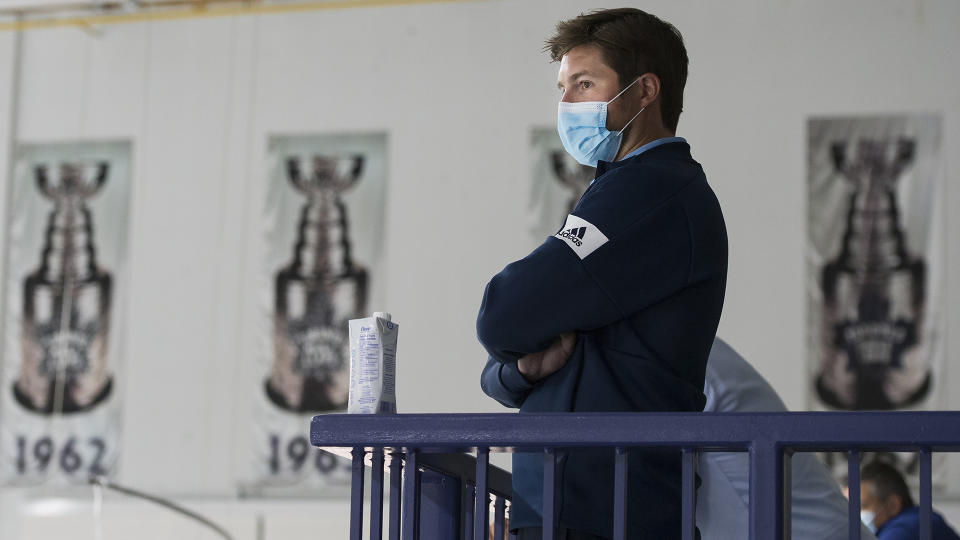With approval ratings dropping, it's time for Kyle Dubas to step up
Kyle Dubas has never had trouble charming his audience.
From that famous nine-hour introduction with Brendan Shanahan, to that presentation in the boardroom of that creative agency in Los Angeles that proved the difference in the John Tavares sweepstakes, to his selfless ownership over the Toronto Maple Leafs’ second consecutive opening-round failure at the hands of the Boston Bruins two springs ago when Mike Babcock had washed his hands of it entirely, he’s always seemed to find a way to endear himself to a certain majority.
And yet, it’s possible that streak of enchantment came to an end over the contents of an hour-long virtual meeting Tuesday afternoon after the Maple Leafs crashed out in the qualification round of the NHL’s restart in a five-game series loss to the Columbus Blue Jackets. Without a stubborn coach or predecessor in the executive board to attract blame after the club failed in a fourth consecutive postseason series, the Maple Leafs GM came under real fire for the very first time in his two seasons in charge in the organization’s exit sessions with the media over Zoom.
And it was his response to that cross-examination that left many of even his staunchest supporters questioning his methods, his process, and his ability to bring change to an operation that appears to be failing.
Still though, it’s worth remembering that what’s plaguing the Leafs right now is a combination of inherited problems and issues only recently created. This is an organization that still divvies out a small percentage of its salary cap to Phil Kessel, but at the same has recently paid the premium in Dubas-led negotiations with its last three legitimate star talents. It’s also a team that will go without its top selection, No. 13 overall, this summer after not picking in the first round last year either to cover up a mistake from a previous regime, but also because the current executive lead ran out of cash to spend.
It’s also a team with a largely barren prospect system. That’s in some ways because it hadn’t been supplied sufficiently for several seasons before, but also since holes left in the current roster construction have forced management to rush players along the development curve.
But more important than all that, it’s also an organization that provided Dubas with one of the most talented core groups in the league. And with it, the Leafs GM still he hasn’t been able to build much more than an average hockey team.
In fact, the team has become worse.

It’s that last point and the last point alone that matters. And it’s that last point that reflects on Dubas and the staff he has put in place.
And yet, after assuming the blame in times when maybe he needn’t have to previously, Dubas was this time reluctant to accept fault for the Leafs’ tragic conclusion, instead deflecting from obvious issues anchoring down the roster with a level of arrogance and mild aggression.
It should have been easy to account for at least one problem, considering the clear and abject failure in his offseason redesign of the club’s defensive pairings. Yet instead, Dubas strangely blamed the organization’s onboarding process for the underwhelming results from the season-long rental of Tyson Barrie, before going on to explain, almost insultingly for fans with the combination of vision and a reasonable understanding of the game, that with the sophisticated data the Leafs use to measure defensive ability, you, too, would see that Cody Ceci was a solid contributor.
Rushing to the defence of two blueliners likely headed to new organizations this fall, it was no surprise, then, that Dubas would stand up for the newest whipping boy, Mitch Marner. In fact, Dubas was at his most irritated when a question was framed in a manner in which it was suggested that Marner wasn’t reaching the expectations set forth by the franchise, which prompted this response:
“I don’t where this all started with the criticizing of Mitch Marner, but to me it’s among the most idiotic things that I see done here."
Unlike last season, when Dubas was reluctant to confirm that either Babcock or Nazem Kadri would return when they reconvened in the fall, there were no hints this time of a shoe to drop. Shanahan backed both Dubas and head coach Sheldon Keefe, who both stated their confidence in the Core Four of Auston Matthews, John Tavares, William Nylander, and of course Marner.
While the approval rates are plummeting at layers of the organization, they aren’t wrong in sticking by each other.
Despite their errors, issues and flaws, the Maple Leafs owe it to themselves to try it again, to rework the design with new pieces, and to start fresh under the guidance of Keefe, who only had a half-season and a two-week training camp in the middle of a pandemic to spread his philosophies to all corners of the operation.
And, it’s also acceptable that the Maple Leafs, and most notably Dubas, chose not to really acknowledge, let alone atone for their errors in the public eye.
As long as they do so in the privacy of their own boardrooms.
The strongest evidence to point toward a willingness to acknowledge their missteps was Dubas’s effort to shed his label he seemed to previous wear proudly. He swore that that the perception of him as something of a renegade when it comes to classic hockey principles is false. Anyone that knows him, he said, “would tell you it is pretty much the opposite.”
Now is the time to prove that it’s true. Because his ways, to this point, sure haven’t worked. And there’s a long way to go.
More Maple Leafs coverage on Yahoo Sports



